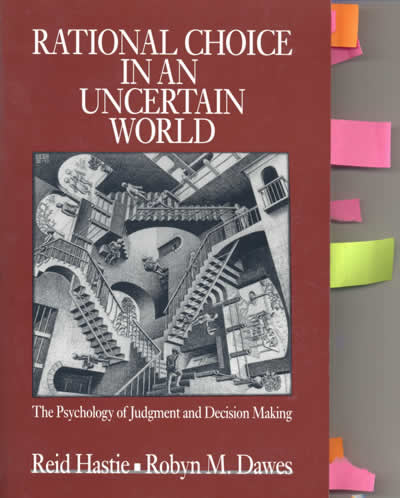EVERYTHING YOU EVER WANTED TO KNOW ABOUT THE AMA INTERVIEWS (2008 edition)

PhD students in Marketing, Psychology, and Economics are now gearing up to get their “packets” ready to mail out by the fourth of July in the hopes of lining up interviews at the annual AMA Summer Educator’s Conference. Each year DSN reprints this sort of “what to expect while you’re applying” guide, first published here by Dan Goldstein in 2005.
WHY AM I WRITING THIS?
I’ve seen the Marketing job market turn happy grad students into quivering masses of fear. I want to share experiences that I and others have contributed, and provide a bit advice to make the whole process less mysterious.
WHAT DO I KNOW?
I’ve been on the AMA job market twice and the Psychology market once. As a professor I’ve conducted 20 AMA interviews and contributed to hiring decisions. I’ve been on the candidate of about 40 AMA interviews, as well as numerous campus visits, face-to-face interviews, offers, and rejections. I’m an outsider to Marketing who went on the market older and with more experience than the average rookie (35 years of age, with 8 years of research scientist, postdoc, visiting scholar, and industry positions). I’ve hired many people for many academic posts, so I know both sides.
HOW TO GET INTO THE AMA JOB MARKET
First, at least a couple months before the conference, find where it will be. It’s called the Summer Educator’s Conference. Strange name, I know. Get yourself a room in the conference hotel, preferably on the floor where the express elevator meets the local elevator for the upper floors. You’ll be hanging out on this floor waiting to change elevators anyway, so you might as well start there.
Next, get your advisor / sponsor to write a cover letter encouraging people to meet with you at AMA. It helps if this person is in Marketing. Get 1 or 2 other letters of recommendation, a CV, and some choice pubs. Put them in an envelope and mail them out to a friend of your sponsor at the desired school. It should look like the letter is coming from your sponsor, even though you are doing the actual assembly and mailing. Repeat this process a bunch of times. It’s a good idea to hit a school with 2 packets, 3 if you suspect they’re a little disorganized. Certainly send one to the recruiting coordinator (they may send letters to your department’s secretary telling you they are hiring) and one to your sponsor’s friend. Mail to schools regardless of whether they are advertising a position or not. This is academia: nobody knows anything. This means you may be sending 50 or more packets. You want to have them mailed by the 4th of July at the absolute latest.
THEN WHAT?
Wait to get calls or emails from schools wishing to set up AMA interviews with you. These calls may come in as late as one week before the conference. Some schools will not invite you for totally unknown reasons. You may get interviews from the top 10 schools and rejected from the 30th-ranked one. Don’t sweat it. Again, this is the land of total and absolute unpredictability that you’re entering into. Also, know that just because you get an interview doesn’t mean they have a job. Sometimes schools don’t know until the last minute if they’ll have funding for a post. Still, you’ll want to meet with them anyway. After the AMA, you’ll hopefully get “fly-outs,” that is, offers to come and visit the campus and give a talk. This means you’ve made the top five or so. Most offers go down in December. There’s a second market that happens after all the schools realize they’ve made offers to the same person. Of course, some schools get wise to this and don’t make offers to amazing people who would have come. We need some kind of market mechanism to work out this part of the system.
THE “IT’S ALL ABOUT FRIENDSHIP” RULE
Keep in mind that you will leave this process with 1 or 0 jobs. Therefore, when talking to a person, the most likely thing is that he or she will not be your colleague in the future. Therefore, think of each opportunity as a chance to make a friend. You’ll need friends to collaborate, to get tenure, get grants, and to go on the market again if you’re not happy with what you get.
HOW DO YOU FIND OUT IN WHICH ROOM TO INTERVIEW?
The schools will leave messages for you telling you in which rooms your interviews will be. You’ll get calls, emails, and notes held for you at the hotel reception. Some schools will fail to get in touch with you so you have to try to find them. Many profs ask the hotel to make their room number public, but for some reason many hotel operators will still not give you the room number. Naturally having a laptop and internet connection allows for emailing of room numbers. Try to take care of this early on the first day.
HOW TO TREAT YOURSELF WHILE THERE
My sponsor gave me the advice of not going out at night and getting room service for breakfast and dinner. This worked for me. Also, the ridiculously high price of a room-service breakfast made me feel like I was sparing no expense, which I found strangely motivating.
HOW DO THE ACTUAL AMA INTERVIEWS GO?
At the pre-arranged time you will knock on their hotel room door. You will be let into a suite (p=.4) or a normal hotel room (p=.5, but see below). In the latter case, there will be professors with long and illustrious titles—people you once imagined as dignified—sitting on beds in their socks. The other people in the room may not look at you when you walk in because they will be looking for a precious few seconds at your CV. For at least some people in the room, this may be the first time they have concentrated on your CV. Yikes is right. Put the important stuff early in your CV so nobody can miss it.
THE SEAT OF HONOR
There will be one armchair in the room. Someone will motion towards the armchair, smile, and say, “You get the seat of honor!” This will happen at every school, at every interview, for three days. I promise.
THE TIME COURSE
There will be two minutes of pleasant chit-chat. They will propose that you talk first and they talk next. There will be a little table next to the chair on which you will put your flip book of slides. You will present for 30 minutes, taking their questions as they come. They will be very nice. When done, they will ask you if you have anything to ask them. You of course do not. You hate this question. You make something up. Don’t worry, they too have a spiel, and all you need to do is find a way to get them started on it. By the time they are done, it’s time for you to leave. The whole experience will feel like it went rather well.
PREDICTING IF YOU WILL GET A FLY-OUT
It’s impossible to tell from how it seems to have gone whether they will give you a fly-out or not. Again, this is the land of staggering and high-impact uncertainty. They might not invite you because you were too bad (and they don’t want you), or because you were too good (and they think they don’t stand a chance of getting you).
DO INTERVIEWS DEVIATE FROM THAT MODEL?
Yes.
Sometimes instead of a hotel room, they will have a private meeting room (p=.075). Sometimes they will have a private meeting room with fruit, coffee, and bottled water (p=.025). Sometimes, they will fall asleep while you are speaking (p=.05). Sometimes they will be rude to you (p=.025). Sometimes a key person will miss an early interview due to a hangover (p=.025). Sometimes, if it’s the end of the day, they will drink alcohol with you (p=.18, given that it’s the end of the day).
HOW YOU THINK THE PROCESS WORKS
The committee has read your CV and cover letter and looked at your pubs. They know your topic and can instantly appreciate that what you are doing is important. They know the value of each journal you have published in and each prize you’ve won. They know your advisor and the strengths she or he instills into each student. They ignore what they’re supposed to ignore and assume everything they’re supposed to assume. They’ll attach a small weight to the interview and fly you out based on your record.
HOW THE PROCESS REALLY WORKS
The interviewers will have looked at your CV for about one minute a couple months ago, and for a few seconds as you walked in the room. They will never have read your entire cover letter, and they will have forgotten most of what they did read. They could care less about your advisor and will get offended that you didn’t cite their advisor. They’ll pay attention to everything they’re supposed to ignore and assume nothing except what you repeat five times. Flouting 50 years of research in judgment and decision-making, they’ll attach a small weight to your CV and fly you out based on your interview.
Your ability to speak English well won’t get you a good job, but your inability to do so will eliminate you from consideration at every top school. Understand that business schools put a premium on teaching. If the interviewers don’t think you can communicate in the classroom, they’re probably not going to take a chance on you. If you are just starting out and your spoken English is shaky, my advice is to work on it as hard as you are working on anything else.
TWO WAYS TO GIVE YOUR SPIEL
1) The plow. You start and the first slide and go through them until the last slide. Stop when interrupted and get back on track.
2) The volley. Keep the slides closed and just talk with the people about your topic. Get them to converse with you, to ask you questions, to ask for clarifications. When you need to show them something, open up the presentation and show them just that slide.
I did the plow the first year and the volley the second year. I got four times more fly-outs the second year. Econometricians are now trying to determine if there was causality.
HOW TO ACT
Make no mistake, you are an actor auditioning for a part. There will be no energy in the room when you arrive. You have to bring the energy into the room with you. The interviewers are tired. They’ve been listening to people in a stuffy hotel room from dawn till dusk for days. If you do an average job, you lose: You have to be two standard deviations above the mean to get a fly-out. So audition for the part, and make yourself stand out. If you want to learn how actors audition, read Audition by Michael Shurtleff.
SOCIAL SKILLS MATTER
From the candidate’s point of view, everything is about the CV and the correctness of the mathematical proofs in the job market paper. However, for better or for worse, extra-academic qualities matter. Here are two examples. 1) The Social Lubricant factor. Departments get visitors all the time: guest speakers, visiting professors, job candidates, etc. Some departments are a bunch of folks who stare at their shoes when introduced to a new person. These departments have a real problem: they have nobody on board who can make visitors feel at ease, and sooner or later word starts to spread about how socially awkward the people at University X are. To fix such problems, departments sometimes hire socially-skilled types who know how to make people comfortable in conversation, and who know how to ask good questions during talks. Also, interviewers assume (probably incorrectly) that people who can talk a good game will be star teachers. 2) The Soft Sell factor. Many people succeed in academia not because they are often right, but also because they are masters of making other people feel like they aren’t wrong. Defensiveness or determination to embarrass when responding to critique is a sure way to blow an interview.
HAVE A QUIRK
One of the biggest risks facing you is that you will be forgotten. Make sure the interviewers know something unusual about you. My quirk is that I worked internationally as a theater director for over 10 years. It’s got nothing to do my research, but I can’t tell you the number of people who bring up this odd little fact when I do campus visits.
DON’T GIVE UP
Never think it’s hopeless. Just because you’re not two SDs above the mean at the school of your dreams, doesn’t mean you’re not the dream candidate of another perfectly good school.
Many candidates don’t realize the following: The students are competing for schools and the schools are competing for students. If you strike out, you can just try again next year. I know a person in Psychology who got 70 rejections in one year. I know a person in Marketing who was told he didn’t place in the top 60 candidates at the 20th ranked school. The subsequent year, both people got hired by top 5 departments. One of them is ridiculously famous!
RUMORS
Don’t gossip. All gossip can mess with your chances. Gossip that you are doing well can hurt you because schools will be afraid to invite you if they think you won’t come. Gossip that you are doing poorly can hurt you because schools that like you will be afraid to invite you if they think no one else does. Sometimes people will ask a prof at your school if you would come to their school, and the prof will then ask you. To heck with that. Just say that if they want to talk to you, they should deal with you directly.
The danger of rumors can be summed up by the following story. At ACR in 2003, I was having a beer with someone who confessed, “you know, my friend X at school Y told me that they want to hire you, but they’re afraid your wife won’t move to Z”. I was single.
ADDENDUM
Have your own advice to add? Want more detail on specific parts of the process? Let me know. dan at dangoldstein dot com.
 Subscribe to Decision Science News by Email (one email per week, easy unsubscribe)
Subscribe to Decision Science News by Email (one email per week, easy unsubscribe)














